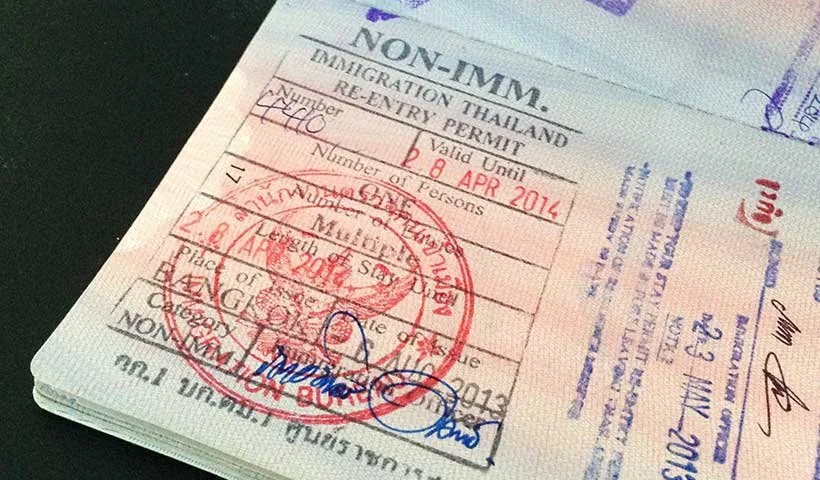Navigate the work visa application process in Thailand with ease! Our guide covers requirements, fees, documents, and more for a smooth experience.
An astonishing 70% of expatriates living in Thailand are engaged in some form of employment, highlighting the kingdom’s allure as a hub for international professionals. However, before embarking on this exciting expat journey, one must navigate the work visa application process in Thailand, a crucial step to legally pursue career aspirations in this Southeast Asian nation. If you’re planning to join the vibrant workforce in Thailand, understanding the intricacies of acquiring a Thailand work permit and securing a Thai work visa is pivotal.
Key Takeaways
- The Thai Work Visa, classified as “Category B” Non-Immigrant Visa, is obligatory for non-Thai citizens wishing to work in Thailand.
- Securing a Thai work visa is a prerequisite for obtaining a Thailand work permit and an Extension of Stay Permit.
- Applicants must gather necessary documents and have a Letter of Approval from the Thailand Ministry of Labour before applying.
- It is essential to procure the work visa prior to entering Thailand, regardless of tourist visa exemptions that might be in place.
- The work visa does more than just authorize employment – it also opens doors to Thailand’s public healthcare system under certain conditions.
- Collaboration with the prospective employer is key to facilitating the visa and work permit process.
- Meticulous attention to detail throughout the visa application process can ensure a smooth transition to working in Thailand.
Understanding the Thailand Work Visa
Embarking on a professional journey in Thailand requires a critical step: the acquisition of a Thai Work Visa. Navigating through the process of obtaining this visa is a task that demands attention to detail and a deep understanding of the legal requirements. Knowing what types of visas are available, who qualifies for them, and the undeniable benefits that come with holding a Thai Work Visa, will give you a head start in your career or business endeavors in Thailand.
Types of Work Visas in Thailand
The Category “B” Non-Immigrant Visa stands out as the primary choice for those intending to engage in employment within Thailand. This visa category is pivotal for every non-Thai citizen who aspires to earn a livelihood in the bustling economy of Thailand, lining up with the mandatory work visa requirements set forth by Thai immigration.
Who Qualifies for a Thai Work Visa?
Qualification for a Thai Work Visa is intertwined with a series of preconditions. Applicants require a valid passport, a carefully completed work visa application form, and a current passport-sized photo. Furthermore, a demonstration of adequate financial means, a police clearance certificate, and the all-important Letter of Approval from the Thailand Ministry of Labour—typically prepared by the employer in Thailand—are indispensable parts of the visa application documents.
Benefits of Holding a Thai Work Visa
Holding a valid Thai work visa is not only the legal gateway to employment in Thailand but also a pass to access essential services such as the public healthcare system under the Universal Coverage Scheme (UCS). Having this visa underscores your legal status in the Thai workforce and forms the foundation for a potentially thriving professional life in this dynamic country.
| Requirement | Description | Importance |
|---|---|---|
| Valid Passport | An official document certifying identity and citizenship. | Essential for any international travel or visa application. |
| Application Form | A document to be filled out by the aspiring work visa applicant. | Crucial for processing your visa request. |
| Passport Photo | A recent photograph adhering to size and background specifications. | Necessary for identification. |
| Financial Means | Proof of adequate funds for the duration of stay. | Assures the government of your financial independence. |
| Police Clearance | A certificate confirming the absence of a criminal record. | A test of character for the security of Thailand. |
| Letter of Approval | Official authorization from the Ministry of Labour, facilitated by the employer. | Validates the job offer and company’s legitimacy to hire foreign workers. |
Getting Started: Documents Required for the Work Visa Application Process in Thailand
Embarking on the journey to work in Thailand involves a comprehensive work visa application checklist. Before you set off, it’s essential to compile the necessary visa application documents to ensure a seamless process. Below, is a detailed guide outlining each item you’ll need for your application. Whether you’re a skilled professional or a prospective teacher, these guidelines will aid in navigating the thorough procedural waters of securing your Thai Work Visa.
- Current Passport: Must be valid for the duration of the visa you are applying for, typically six months to one year after your planned arrival.
- Completed Work Visa Application Form: Obtainable either online or at your local Thai consulate or embassy.
- Passport-Sized Photographs: Conform to the required dimensions and background specifications, typically two inches with a white backdrop.
- Evidence of Financial Sufficiency: Bank statements or a letter from your bank indicating you have the financial means to cover your stay.
- Police Clearance Certificate: A document showing you have no criminal record and are permitted to travel abroad.
- Letter of Approval from the Thai Ministry of Labour: This is often facilitated by your future employer and is a cornerstone of your visa application.
For educators, additional documentation must accompany the application, such as:
- Acceptance Letter: Provided by the educational institution where you will be teaching.
- School’s License and Shareholder List: To verify the legitimacy of the educational institution.

Preparing each document with attention to detail will not only expedite your application but can also alleviate potential hurdles that may arise during the meticulous assessment by Thai immigration officials. Remember, each document is a step towards your new professional adventure in Thailand, ensuring compliance with local laws and regulations.
The Detailed Work Visa Application Process in Thailand
Embarking on the journey to secure a work visa in Thailand begins with a detailed understanding of the process and procedures. Whether you’re applying from your home country or are already residing in Thailand, knowledge of visa application fees and the work visa processing time can greatly aid in planning your application schedule.
Applying from Your Home Country
To start your application from abroad, your first point of contact is the Thai Embassy or Consulate in your home country. They will provide information on the necessary documents, appointment availability, and specific processes relevant to your region.
Processing Times and Fees
The processing times for work visa applications can vary. Typically, applicants should anticipate a waiting period as Thai Embassies and Consulates diligently work through visa submissions. The fees are equally important to note:

| Visa Type | Cost (Thai Baht) | Equivalent Cost (USD)* |
|---|---|---|
| Single-Entry Visa | 2,000 | ~60 |
| Multiple-Entry Visa | 5,000 | ~150 |
*The USD equivalents are approximate and subject to currency fluctuations.
Changing Visa Categories within Thailand
If you’re already in Thailand on a different type of visa, it’s possible in some situations to convert it to a Non-Immigrant Visa “B” Category. This, however, is not always guaranteed and is subject to the discretion of the Immigration Office.
Understanding these aspects of the visa application process ensures a more predictable journey toward employment in Thailand. Being well-prepared can save you time and avoid potential setbacks.
Navigating Employment and Work Permit Essentials
Embarking on your career journey in Thailand involves understanding the intricacies of obtaining a Thailand work permit. It’s a process that entails meticulous coordination with your prospective employer and compliance with the country’s labor regulations.

Eligibility Criteria for Applicants and Employers
Before you can successfully submit your work permit application, certain requirements must be met. For applicants, possessing a valid Thai Work Visa and relevant academic credentials is just the starting point. Employers, on the other hand, must fulfill their share of obligations, including meeting the Ministry of Labour’s standards on capital and tax contributions—key factors that will be scrutinized during the application review.
Obtaining a Thailand Work Permit
Once in Thailand with your work visa, you can proceed with the work permit application. You’ll need to furnish various documents, such as your passport, visa, academic certificates, an employment offer, and a health certificate. It’s essential to note that each work permit is job-specific; it’s entrenched in your role and tied to your employer, requiring you to reapply should either element shift.
Role of Employer in Work Permit Application
Your employer plays a pivotal role in the process, responsible for submitting corporate documents like company certification and tax details. As an aspiring employee in Thailand, it’s beneficial to maintain open communication with your employer to ensure all paperwork accurately reflects the nuances of your prospective position and meets regulatory expectations.
With careful attention to each stage of the application and a comprehensive understanding of the requirements both you and your employer must fulfill, obtaining a work permit in Thailand can be a smooth and orderly experience. Always remember, the right preparation can pave the way for a rewarding professional endeavor in the Land of Smiles.
Conclusion
Navigating the journey to secure a Thailand work permit and Thai work visa is an involved process that demands attention to detail and a clear understanding of the legal framework. By following the work visa application process in Thailand meticulously, applicants enhance their prospects of a smooth transition into the Thai workforce. It is paramount for both the applicant and the employer to work closely together, ensuring that all the pieces of documentation are accurately prepared and submitted within the regulated work visa processing time.
While the procedure might at times appear daunting, being well-informed about the visa application fees, processing timeframes, and the nuances of the work permit application will pay dividends in avoiding unnecessary delays or complications. Keeping up-to-date with the regulations regarding extensions and regularly reviewing one’s visa status will contribute to a lawful and serene professional life in Thailand. After all, the completion of these procedures opens the door to invaluable career opportunities in one of Southeast Asia’s most dynamic economic landscapes.
Remember, although the work visa application process in Thailand demands rigour and precision, the reward lies in the rich, cultural, and professional experience that awaits in this captivating nation. By adhering to the correct steps and maintaining effective collaboration with your employer, you are setting the foundations for a fruitful and legally compliant working tenure in Thailand.
FAQ
What are the different types of work visas available in Thailand?
The primary type of work visa in Thailand is the Category “B” Non-Immigrant Visa, which is designated for those who intend to work in the country. There can be sub-categories depending on the nature of the work or the qualifications of the applicant.
Who qualifies for a Thai Work Visa?
Individuals who possess a valid passport, completed application form, recent passport-sized photo, proof of financial means, a police clearance certificate, and a Letter of Approval from the Thailand Ministry of Labour are generally eligible for a Thai Work Visa.
What are the benefits of holding a Thai Work Visa?
Holding a Thai Work Visa provides the legal right to work in Thailand and may also grant access to the Thai public healthcare system under the Universal Coverage Scheme (UCS).
What documents are required for a Thai Work Visa application?
A valid passport, filled and signed work visa application form, passport-sized photographs, evidence of financial sufficiency, a police clearance certificate, and a Letter of Approval from the Thai Ministry of Labour are often required. Additional documents may vary depending on the specific employment.
How do I apply for a Thai Work Visa from my home country?
Start by contacting your nearest Thai Embassy or Consulate to schedule an appointment and obtain specific instructions. Submit the complete work visa application along with the necessary documents either by mail or in person.
What are the processing times and fees for a Thai Work Visa?
Processing times can vary but usually take several business days. Fees are approximately 2,000 Thai Baht for a single-entry visa and 5,000 Thai Baht for a multiple-entry visa.
Can I change my visa category to a work visa while in Thailand?
It is possible to convert a different visa category to a Non-Immigrant “B” Category visa within Thailand, though it’s subject to eligibility and is not guaranteed.
What are the eligibility criteria for a Thailand Work Permit?
The company employing the applicant must meet specific criteria such as minimum capital requirements and tax payments. The applicant also needs various documents including their passport, work visa, academic credentials, employment offer, CV, proof of address, and a health certificate.
How can I obtain a Thailand Work Permit?
After securing a Thai Work Visa, apply for the work permit by submitting the requisite documentation to the Thai Ministry of Labour. The processing time is typically around seven business days.
What is the role of an employer in the work permit application?
Employers are responsible for facilitating the Letter of Approval from the Ministry of Labour and providing company documentation, such as certificates and tax documentation, as part of the work permit application process.






Leave a reply